
Cerebr
Chat with web content by AI. web demo url: https://cerebr.yym68686.top
Stars: 250
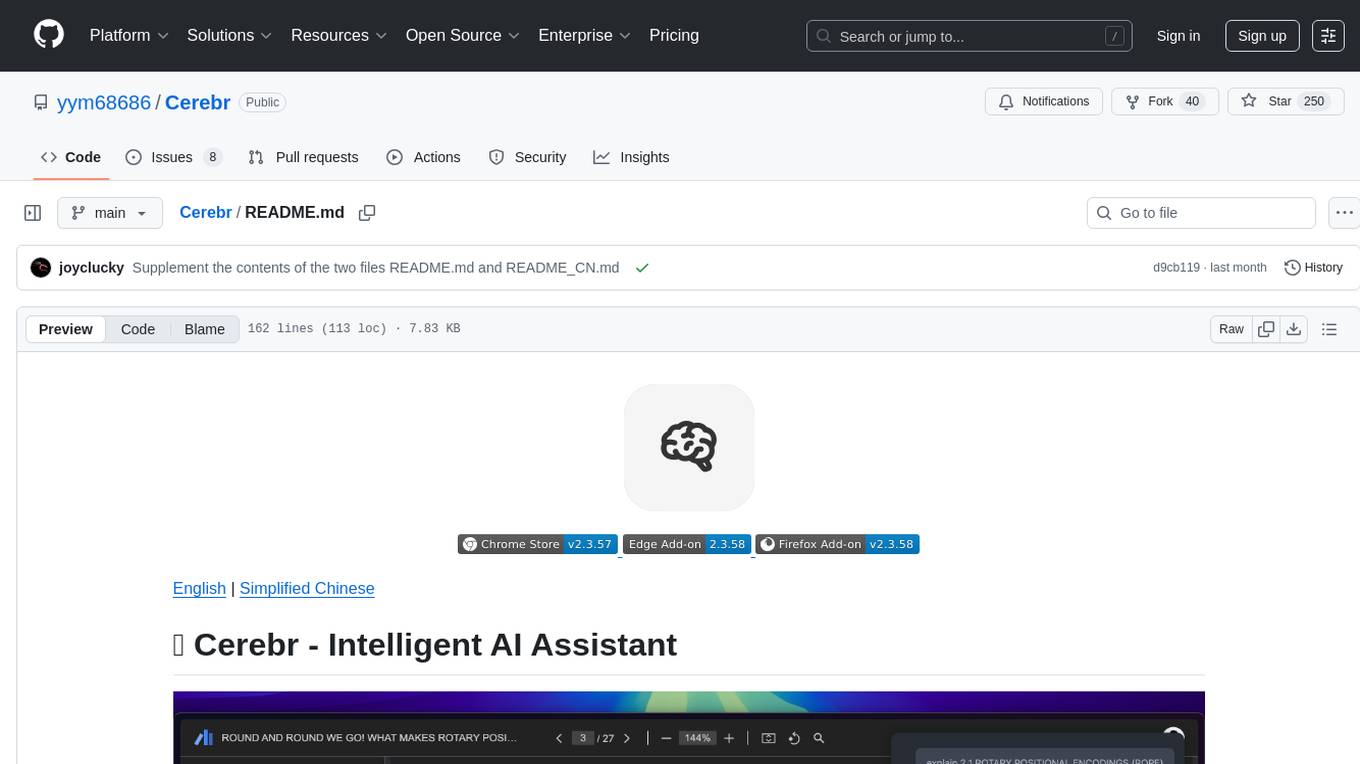
Cerebr is an intelligent AI assistant browser extension designed to enhance work efficiency and learning experience. It integrates powerful AI capabilities from various sources to provide features such as smart sidebar, multiple API support, cross-browser API configuration synchronization, comprehensive Q&A support, elegant rendering, real-time response, theme switching, and more. With a minimalist design and focus on delivering a seamless, distraction-free browsing experience, Cerebr aims to be your second brain for deep reading and understanding.
README:
The name "Cerebr" comes from a Latin root related to "brain" or "cerebrum". This etymology reflects our vision: to integrate powerful AI capabilities from Claude, OpenAI, and others, making Cerebr your second brain for deep reading and understanding. Cerebr is a powerful browser AI assistant extension, available for Chrome, Firefox, and Edge, focused on enhancing your work efficiency and learning experience.
Born from a need for a clean, efficient browser AI assistant, Cerebr stands out with its minimalist design and powerful features. While other solutions often come with limitations or cluttered interfaces, Cerebr focuses on delivering a seamless, distraction-free experience for your web browsing needs.
- 🎯 Smart Sidebar - Quick access via hotkey (Windows:
Alt+Z/ Mac:Ctrl+Z) to chat with AI anytime, anywhere - 🔄 Multiple API Support - Configure multiple APIs to flexibly switch between different AI assistants
- 🔁 Config Sync - Cross-browser API configuration synchronization for seamless device switching
- 💻 Multi-Platform Support - Available for Chrome, Firefox, and Edge, bringing a consistent experience across browsers.
- 📝 Comprehensive Q&A - Support webpage content Q&A, PDF document Q&A, image Q&A and more
- 🎨 Elegant Rendering - Perfect support for Markdown text rendering and LaTeX math formula display
- ⚡ Real-time Response - Stream output for instant AI replies
- ⏹️ Flexible Control - Support stopping generation at any time, sending new messages will stop the current generation
- 🌓 Theme Switching - Support light/dark themes to protect your eyes
- 🌐 Web Version - Support web version, no installation required, accessable from any browser, support vercel, GitHub Pages and cloudflare pages deployment
- 💾 State Persistence - Automatically save chat history, sidebar status, etc.
- 🔄 Config Sync - Cross-device configuration sharing through browser's native sync API
- 🔍 Smart Extraction - Automatically identify and extract webpage/PDF content
- ⌨️ Shortcut Operations - Support hotkey to clear chat (Windows:
Alt+X/ Mac:Ctrl+X), up/down keys for quick history recall - 🔒 Secure & Reliable - Support multiple API key management with local data storage
- 🎭 High Compatibility - Officially supports Chrome, Firefox, and Edge, adapting to various webpage environments.
-
🔑 Configure API
- Click the settings button
- Fill in API Key, Base URL and model name
- Support adding multiple API configurations
-
💬 Start Chatting
- Use hotkey Windows:
Alt+Z/ Mac:Ctrl+Zto summon sidebar - Input questions and send
- Support image upload for visual Q&A
- Use hotkey Windows:
-
📚 Webpage/PDF Q&A
- Enable webpage Q&A switch
- Automatically identify and extract current page content
- Support intelligent PDF file Q&A
- 📋 Right-click Copy - Support right-click to directly copy message text
- 🔄 History Records - Use up/down arrow keys to quickly recall historical questions
- ⏹️ Stop Generation - Show stop button when generating messages, can stop generation at any time
- 🖼️ Image Preview - Click images to view full size
- ⚙️ Custom Settings - Support customizing hotkeys, themes and more
- You can quickly deploy the web version of Cerebr to Vercel with one click:
- You can deploy to Cloudflare Pages:
2.1 After registering a Cloudflare account, apply for a Workers API TOKEN.
After entering the Cloudflare homepage, select "Profile" in the upper right corner -> "My Profile" -> "API Tokens" -> "Create Token" -> "Edit Cloudflare Workers" -> You can choose the permissions for "Account Resources" and "Zone Resources" by yourself -> Continue to summary -> Create Token -> Save the token (Note: Save your token properly as it will only be displayed once).
2.2 Return to the homepage, find "Workers" on the left -> Open "Workers & Pages" -> Click "Create" -> "Pages" -> "Import an existing Git repository" -> Find the forked repository -> Begin setup.
2.3 Enter a name you like for the project, and in the "Build command" field, input:
npm install -g wrangler && wrangler pages deploy . --project-name cerebr --branch main
2.4 In the "Environment variables (advanced)" section below -> Add variable:
CLOUDFLARE_API_TOKEN: Fill in the API just applied for
CLOUDFLARE_ACCOUNT_ID: Obtained from the URL of the Cloudflare dashboard homepage, in the format like https://dash.cloudflare.com/<ACCOUNT_ID>
2.5 Save and deploy.
(Since direct build and deployment will cause the API and accountID to be saved in plain text, if you want to change them to ciphertext, you can choose to click "Continue to project" after deployment is completed -> "Settings" -> "Variables and Secrets" -> "Edit" -> Change the "Text" form to "Secret" -> Save)
- You can also deploy to GitHub Pages:
# Fork this repository
# Then go to your repository's Settings -> Pages
# In the "Build and deployment" section:
# - Select "Deploy from a branch" as Source
# - Choose your branch (main/master) and root (/) folder
# - Click SaveThe deployment will be automatically handled by GitHub Actions. You can access your site at https://<your-username>.github.io/cerebr
- 🌐 Access Cerebr from any browser without installation
- 💻 Same powerful features as the Chrome extension
- ☁️ Deploy your own instance for better control
- 🔒 Secure and private deployment
After installing the dmg file, you need to execute the following command:
sudo xattr -r -d com.apple.quarantine /Applications/Cerebr.appThis project uses Pake to pack the dmg file, the command is as follows:
iconutil -c icns icon.iconset
pake https://xxx/ --name Cerebr --hide-title-bar --icon ./icon.icns- 🆕 Added image Q&A functionality
- 🔄 Optimized webpage content extraction algorithm
- 🐛 Fixed math formula rendering issues
- ⚡ Improved overall performance and stability
This project is developed using Chrome Extension Manifest V3, with main tech stack:
- 🎨 Native JavaScript + CSS
- 📦 Chrome Extension API
- 🔧 PDF.js + KaTeX + Marked.js
Welcome to submit Issues and Pull Requests to help improve the project. Before submitting, please ensure:
- 🔍 You have searched related issues
- ✅ Follow existing code style
- 📝 Provide clear description and reproduction steps
This project is licensed under the GPLv3 License
For Tasks:
Click tags to check more tools for each tasksFor Jobs:
Alternative AI tools for Cerebr
Similar Open Source Tools

Cerebr
Cerebr is an intelligent AI assistant browser extension designed to enhance work efficiency and learning experience. It integrates powerful AI capabilities from various sources to provide features such as smart sidebar, multiple API support, cross-browser API configuration synchronization, comprehensive Q&A support, elegant rendering, real-time response, theme switching, and more. With a minimalist design and focus on delivering a seamless, distraction-free browsing experience, Cerebr aims to be your second brain for deep reading and understanding.
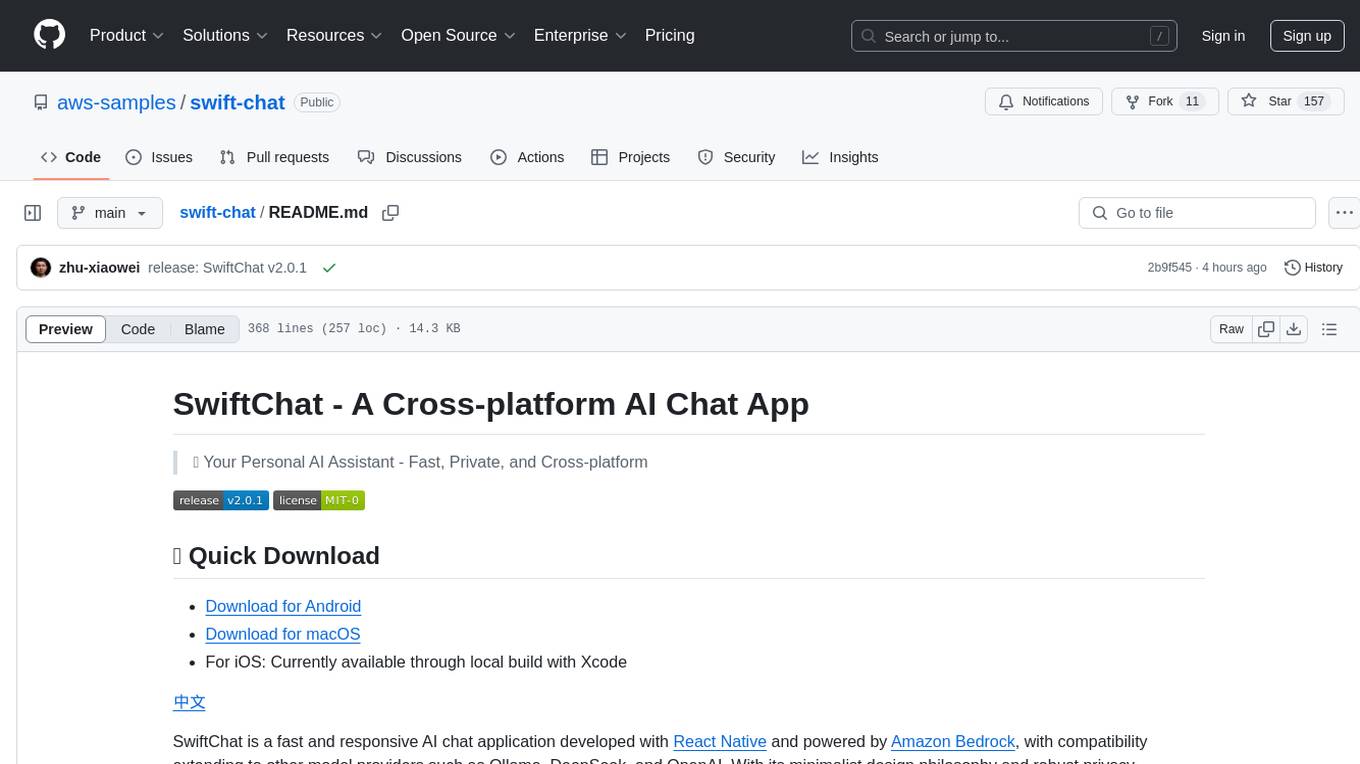
swift-chat
SwiftChat is a fast and responsive AI chat application developed with React Native and powered by Amazon Bedrock. It offers real-time streaming conversations, AI image generation, multimodal support, conversation history management, and cross-platform compatibility across Android, iOS, and macOS. The app supports multiple AI models like Amazon Bedrock, Ollama, DeepSeek, and OpenAI, and features a customizable system prompt assistant. With a minimalist design philosophy and robust privacy protection, SwiftChat delivers a seamless chat experience with various features like rich Markdown support, comprehensive multimodal analysis, creative image suite, and quick access tools. The app prioritizes speed in launch, request, render, and storage, ensuring a fast and efficient user experience. SwiftChat also emphasizes app privacy and security by encrypting API key storage, minimal permission requirements, local-only data storage, and a privacy-first approach.

DevoxxGenieIDEAPlugin
Devoxx Genie is a Java-based IntelliJ IDEA plugin that integrates with local and cloud-based LLM providers to aid in reviewing, testing, and explaining project code. It supports features like code highlighting, chat conversations, and adding files/code snippets to context. Users can modify REST endpoints and LLM parameters in settings, including support for cloud-based LLMs. The plugin requires IntelliJ version 2023.3.4 and JDK 17. Building and publishing the plugin is done using Gradle tasks. Users can select an LLM provider, choose code, and use commands like review, explain, or generate unit tests for code analysis.
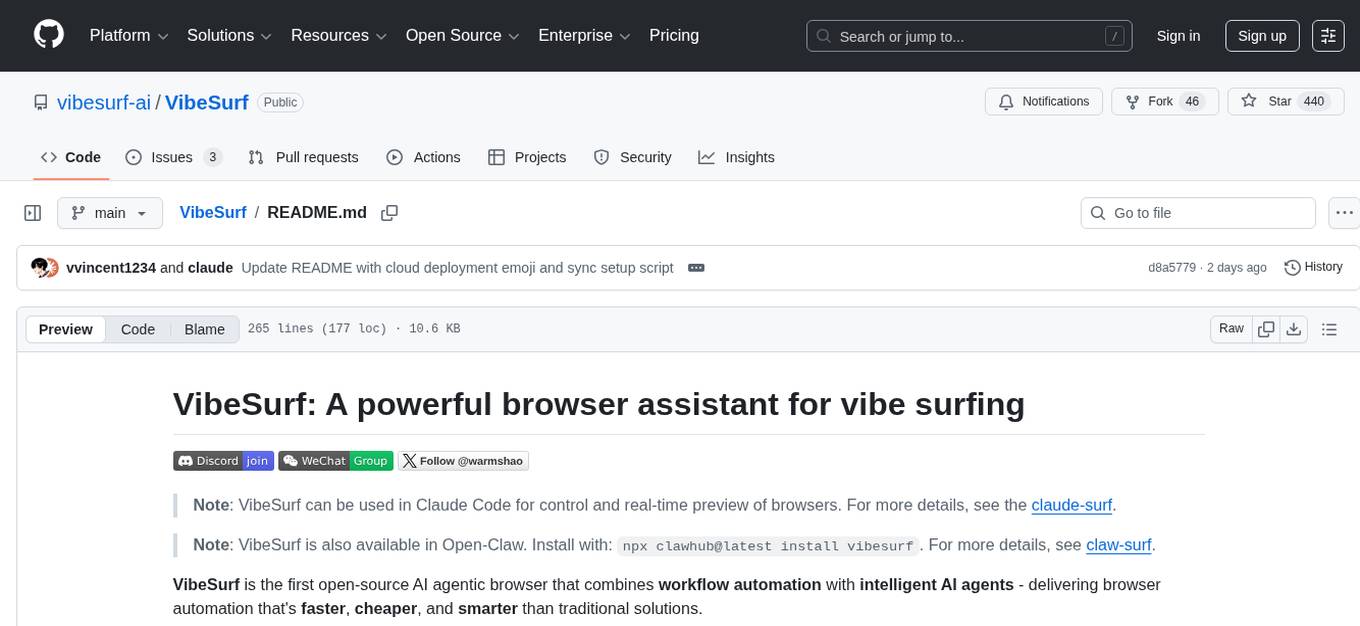
VibeSurf
VibeSurf is an open-source AI agentic browser that combines workflow automation with intelligent AI agents, offering faster, cheaper, and smarter browser automation. It allows users to create revolutionary browser workflows, run multiple AI agents in parallel, perform intelligent AI automation tasks, maintain privacy with local LLM support, and seamlessly integrate as a Chrome extension. Users can save on token costs, achieve efficiency gains, and enjoy deterministic workflows for consistent and accurate results. VibeSurf also provides a Docker image for easy deployment and offers pre-built workflow templates for common tasks.
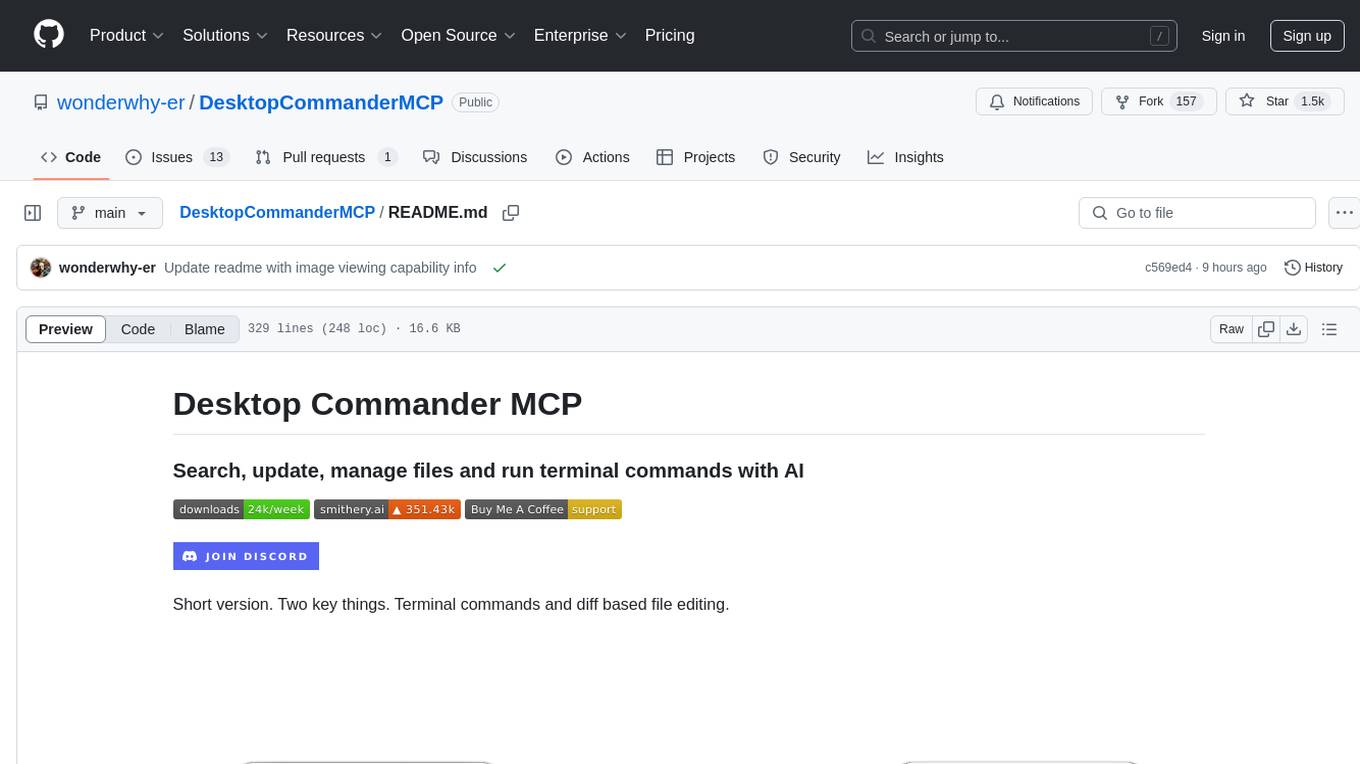
DesktopCommanderMCP
Desktop Commander MCP is a server that allows the Claude desktop app to execute long-running terminal commands on your computer and manage processes through Model Context Protocol (MCP). It is built on top of MCP Filesystem Server to provide additional search and replace file editing capabilities. The tool enables users to execute terminal commands with output streaming, manage processes, perform full filesystem operations, and edit code with surgical text replacements or full file rewrites. It also supports vscode-ripgrep based recursive code or text search in folders.

TaskingAI
TaskingAI brings Firebase's simplicity to **AI-native app development**. The platform enables the creation of GPTs-like multi-tenant applications using a wide range of LLMs from various providers. It features distinct, modular functions such as Inference, Retrieval, Assistant, and Tool, seamlessly integrated to enhance the development process. TaskingAI’s cohesive design ensures an efficient, intelligent, and user-friendly experience in AI application development.
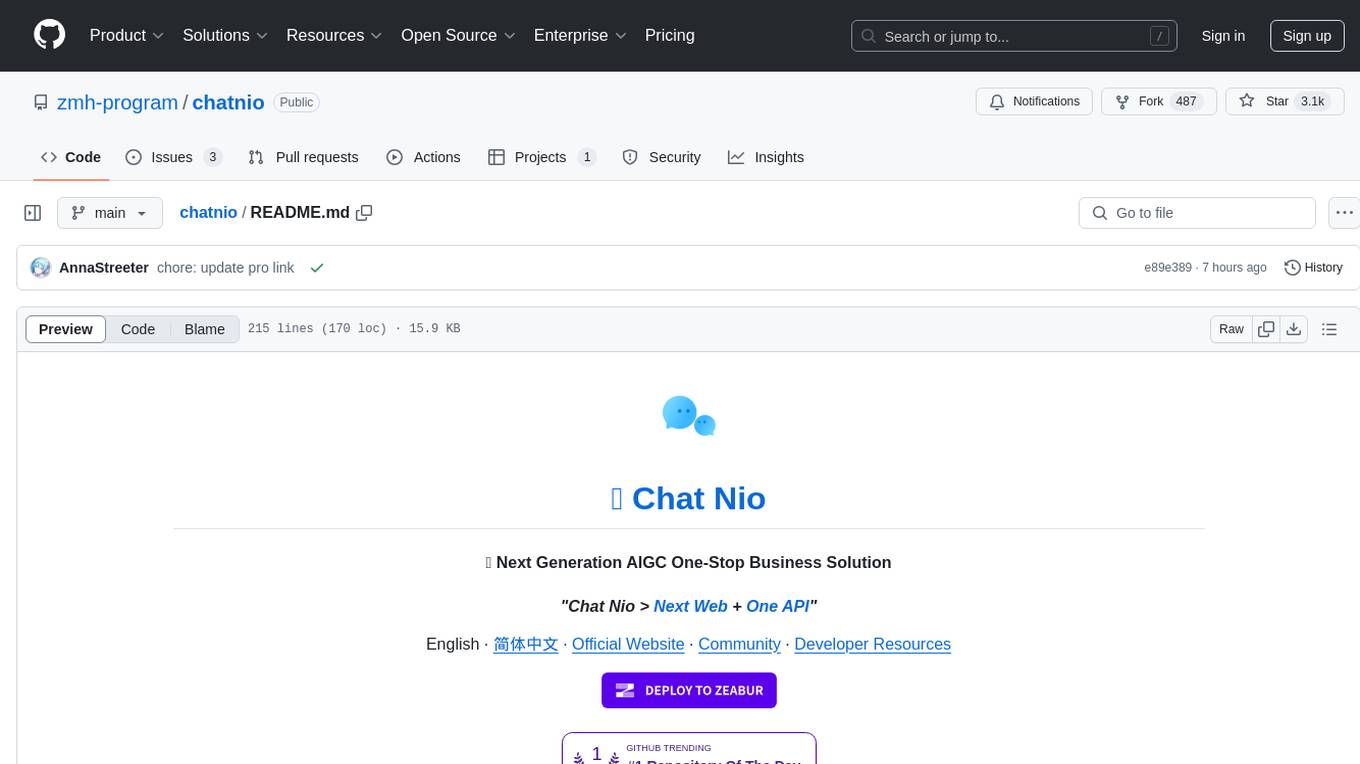
chatnio
Chat Nio is a next-generation AIGC one-stop business solution that combines the advantages of frontend-oriented lightweight deployment projects with powerful API distribution systems. It offers rich model support, beautiful UI design, complete Markdown support, multi-theme support, internationalization support, text-to-image support, powerful conversation sync, model market & preset system, rich file parsing, full model internet search, Progressive Web App (PWA) support, comprehensive backend management, multiple billing methods, innovative model caching, and additional features. The project aims to address limitations in conversation synchronization, billing, file parsing, conversation URL sharing, channel management, and API call support found in existing AIGC commercial sites, while also providing a user-friendly interface design and C-end features.
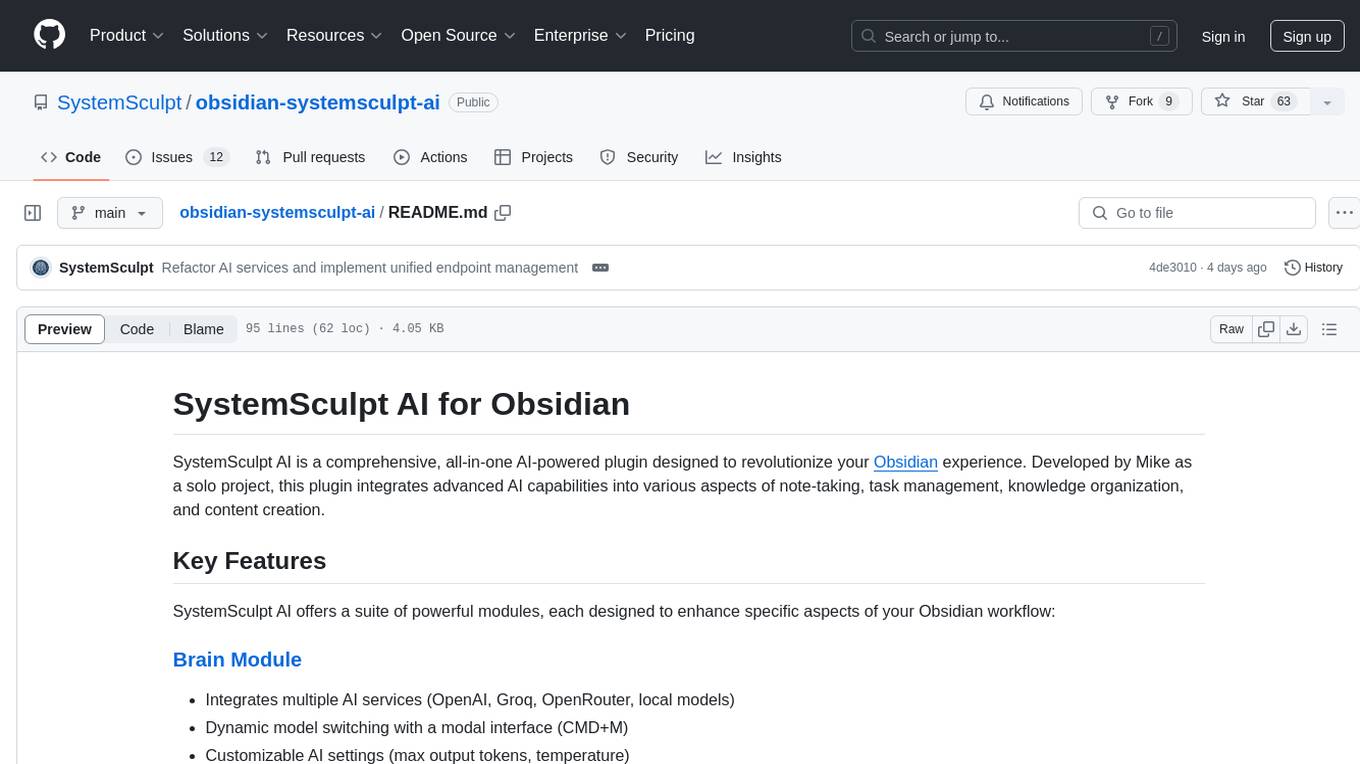
obsidian-systemsculpt-ai
SystemSculpt AI is a comprehensive AI-powered plugin for Obsidian, integrating advanced AI capabilities into note-taking, task management, knowledge organization, and content creation. It offers modules for brain integration, chat conversations, audio recording and transcription, note templates, and task generation and management. Users can customize settings, utilize AI services like OpenAI and Groq, and access documentation for detailed guidance. The plugin prioritizes data privacy by storing sensitive information locally and offering the option to use local AI models for enhanced privacy.
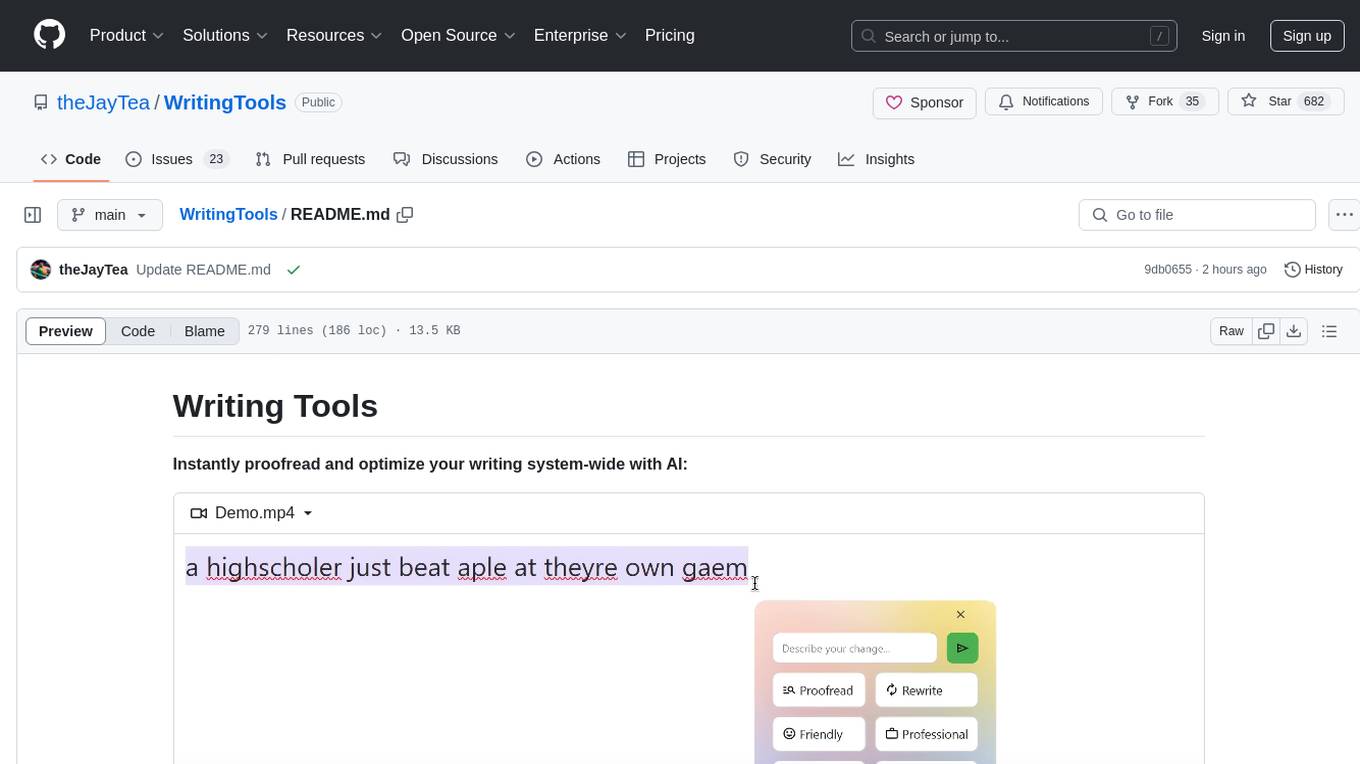
WritingTools
Writing Tools is an Apple Intelligence-inspired application for Windows, Linux, and macOS that supercharges your writing with an AI LLM. It allows users to instantly proofread, optimize text, and summarize content from webpages, YouTube videos, documents, etc. The tool is privacy-focused, open-source, and supports multiple languages. It offers powerful features like grammar correction, content summarization, and LLM chat mode, making it a versatile writing assistant for various tasks.
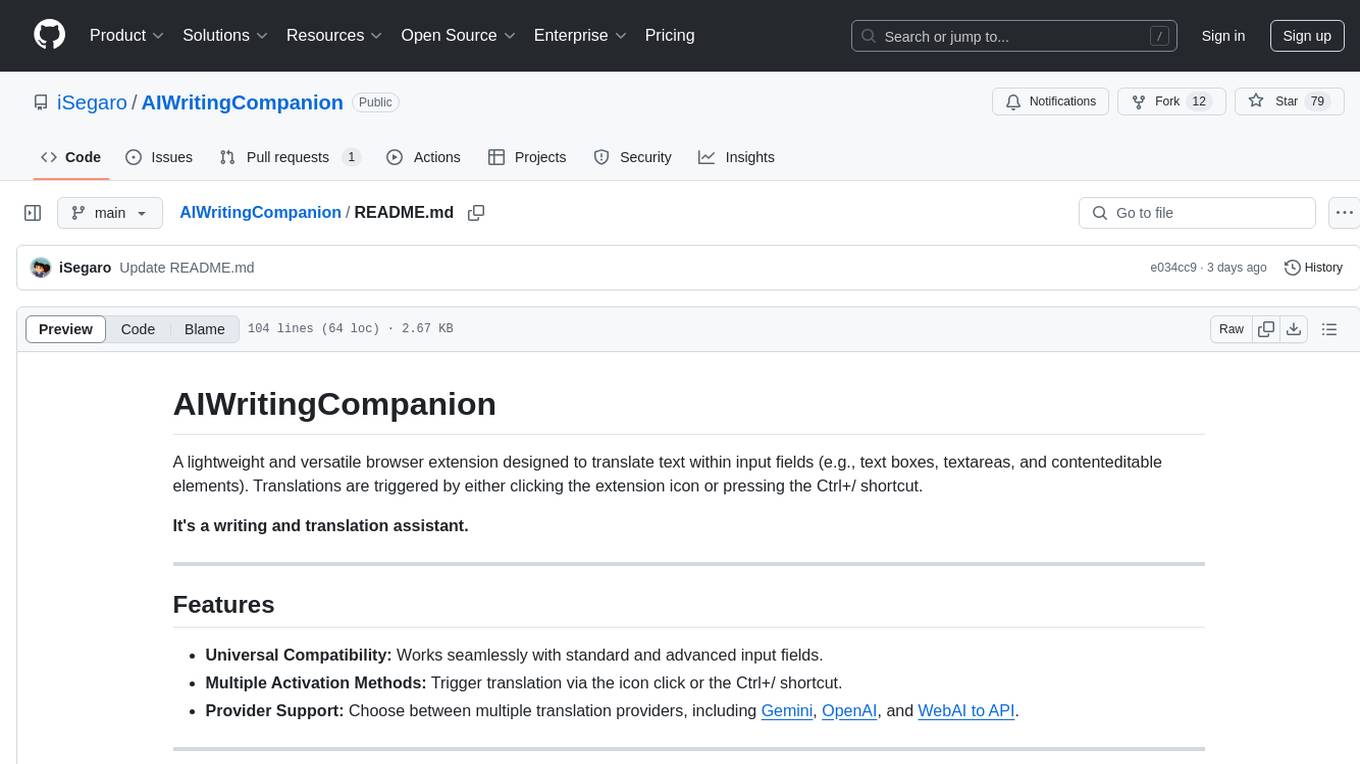
AIWritingCompanion
AIWritingCompanion is a lightweight and versatile browser extension designed to translate text within input fields. It offers universal compatibility, multiple activation methods, and support for various translation providers like Gemini, OpenAI, and WebAI to API. Users can install it via CRX file or Git, set API key, and use it for automatic translation or via shortcut. The tool is suitable for writers, translators, students, researchers, and bloggers. AI keywords include writing assistant, translation tool, browser extension, language translation, and text translator. Users can use it for tasks like translate text, assist in writing, simplify content, check language accuracy, and enhance communication.
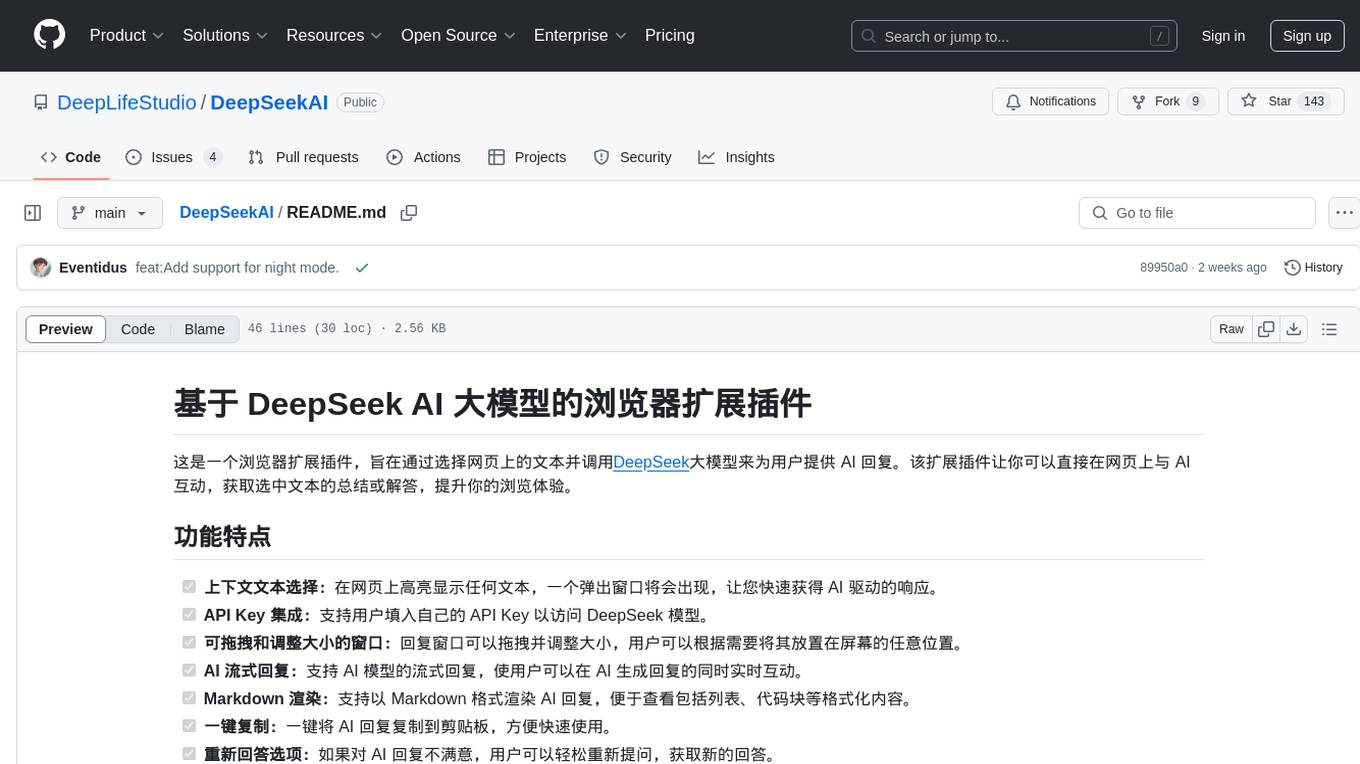
DeepSeekAI
DeepSeekAI is a browser extension plugin that allows users to interact with AI by selecting text on web pages and invoking the DeepSeek large model to provide AI responses. The extension enhances browsing experience by enabling users to get summaries or answers for selected text directly on the webpage. It features context text selection, API key integration, draggable and resizable window, AI streaming replies, Markdown rendering, one-click copy, re-answer option, code copy functionality, language switching, and multi-turn dialogue support. Users can install the extension from Chrome Web Store or Edge Add-ons, or manually clone the repository, install dependencies, and build the extension. Configuration involves entering the DeepSeek API key in the extension popup window to start using the AI-driven responses.

easydiffusion
Easy Diffusion 3.0 is a user-friendly tool for installing and using Stable Diffusion on your computer. It offers hassle-free installation, clutter-free UI, task queue, intelligent model detection, live preview, image modifiers, multiple prompts file, saving generated images, UI themes, searchable models dropdown, and supports various image generation tasks like 'Text to Image', 'Image to Image', and 'InPainting'. The tool also provides advanced features such as custom models, merge models, custom VAE models, multi-GPU support, auto-updater, developer console, and more. It is designed for both new users and advanced users looking for powerful AI image generation capabilities.
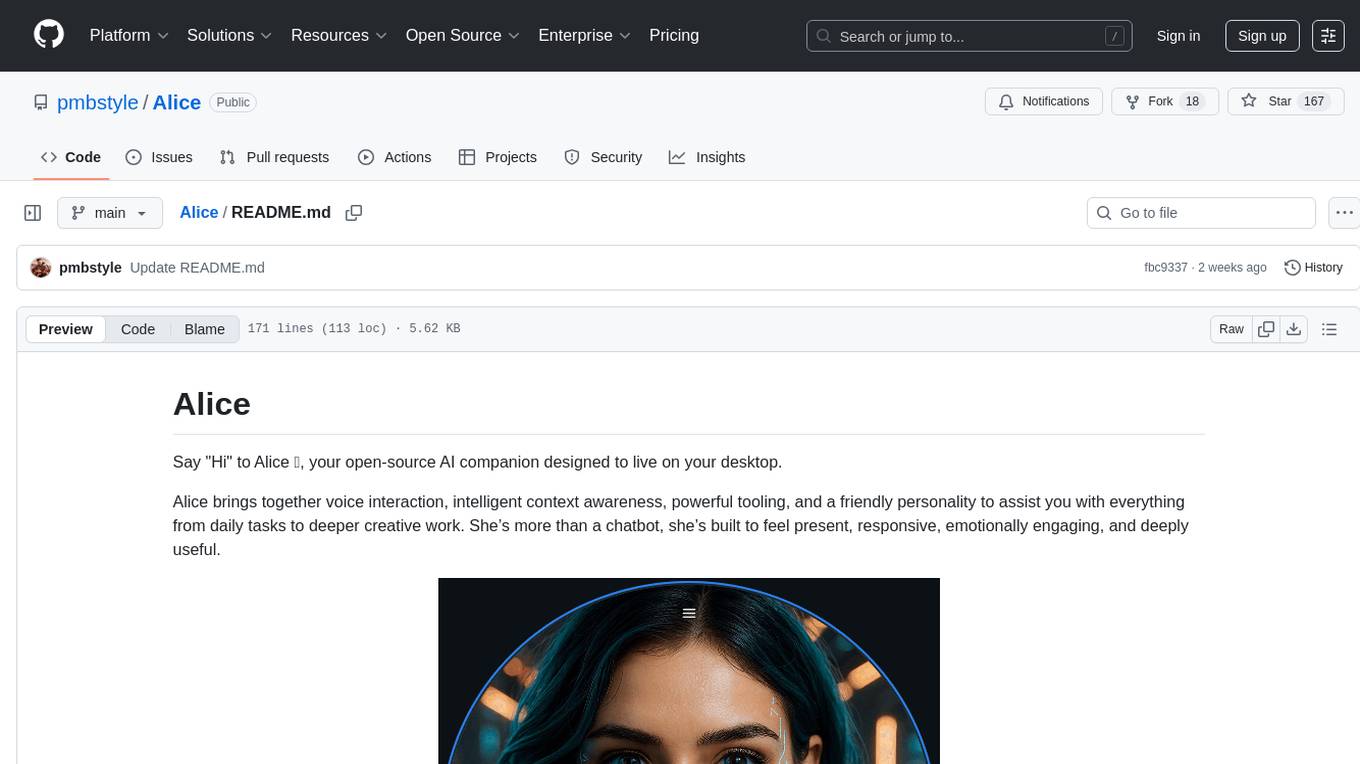
Alice
Alice is an open-source AI companion designed to live on your desktop, providing voice interaction, intelligent context awareness, and powerful tooling. More than a chatbot, Alice is emotionally engaging and deeply useful, assisting with daily tasks and creative work. Key features include voice interaction with natural-sounding responses, memory and context management, vision and visual output capabilities, computer use tools, function calling for web search and task scheduling, wake word support, dedicated Chrome extension, and flexible settings interface. Technologies used include Vue.js, Electron, OpenAI, Go, hnswlib-node, and more. Alice is customizable and offers a dedicated Chrome extension, wake word support, and various tools for computer use and productivity tasks.
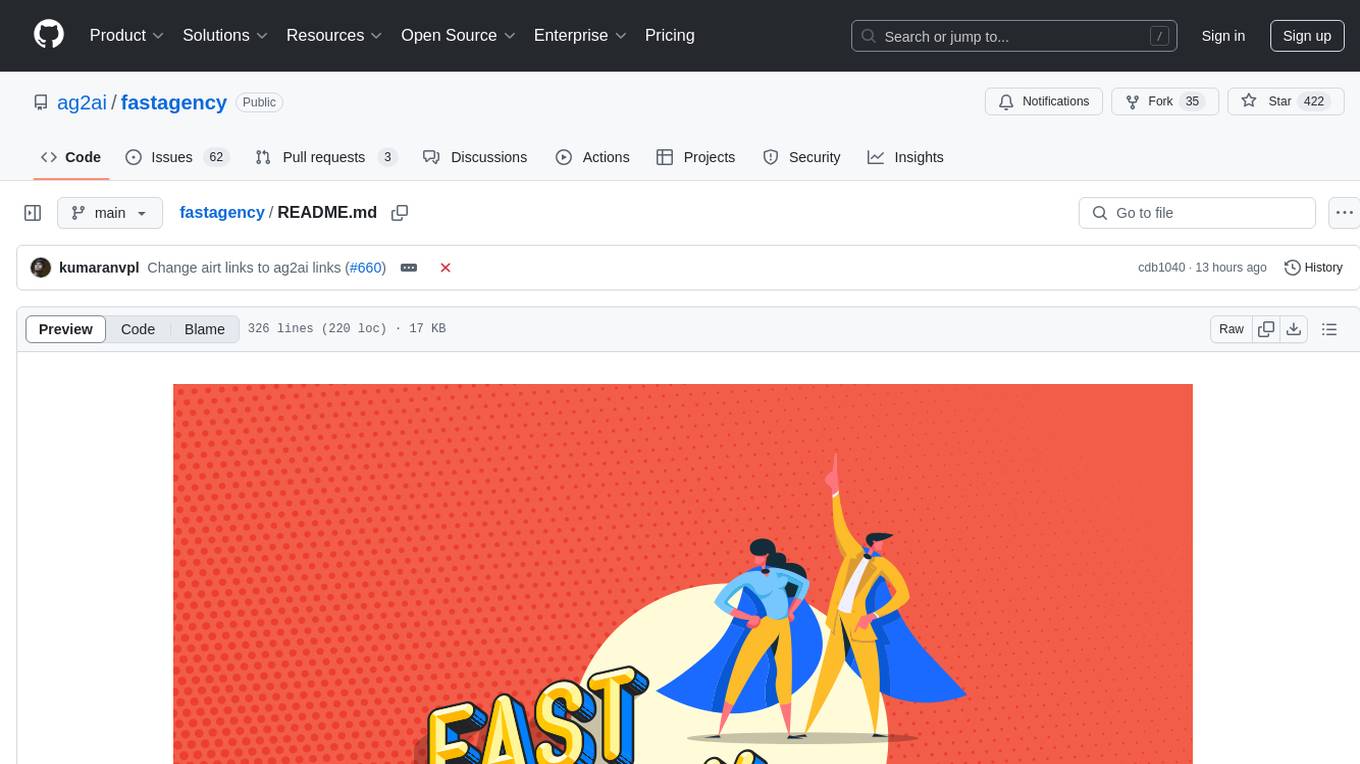
fastagency
FastAgency is an open-source framework designed to accelerate the transition from prototype to production for multi-agent AI workflows. It provides a unified programming interface for deploying agentic workflows written in AG2 agentic framework in both development and productional settings. With features like seamless external API integration, a Tester Class for continuous integration, and a Command-Line Interface (CLI) for orchestration, FastAgency streamlines the deployment process, saving time and effort while maintaining flexibility and performance. Whether orchestrating complex AI agents or integrating external APIs, FastAgency helps users quickly transition from concept to production, reducing development cycles and optimizing multi-agent systems.
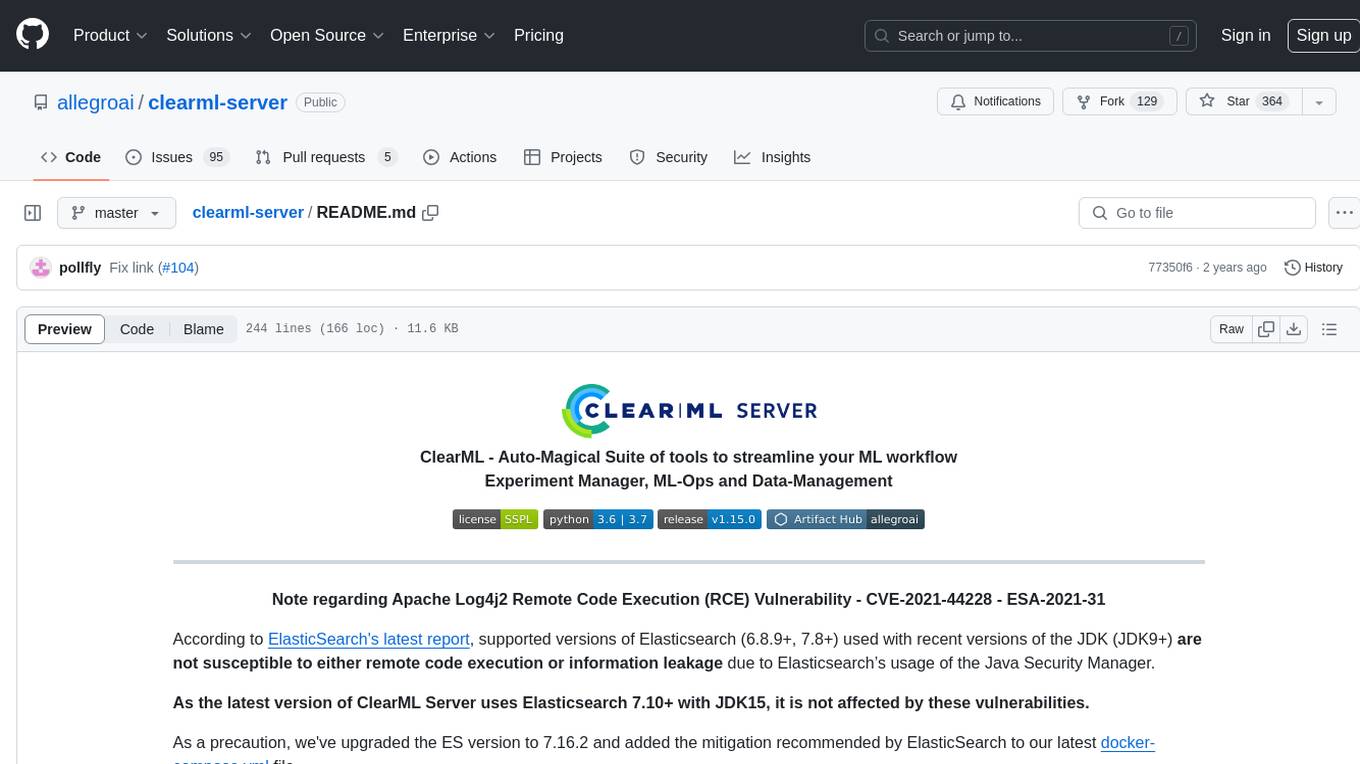
clearml-server
ClearML Server is a backend service infrastructure for ClearML, facilitating collaboration and experiment management. It includes a web app, RESTful API, and file server for storing images and models. Users can deploy ClearML Server using Docker, AWS EC2 AMI, or Kubernetes. The system design supports single IP or sub-domain configurations with specific open ports. ClearML-Agent Services container allows launching long-lasting jobs and various use cases like auto-scaler service, controllers, optimizer, and applications. Advanced functionality includes web login authentication and non-responsive experiments watchdog. Upgrading ClearML Server involves stopping containers, backing up data, downloading the latest docker-compose.yml file, configuring ClearML-Agent Services, and spinning up docker containers. Community support is available through ClearML FAQ, Stack Overflow, GitHub issues, and email contact.
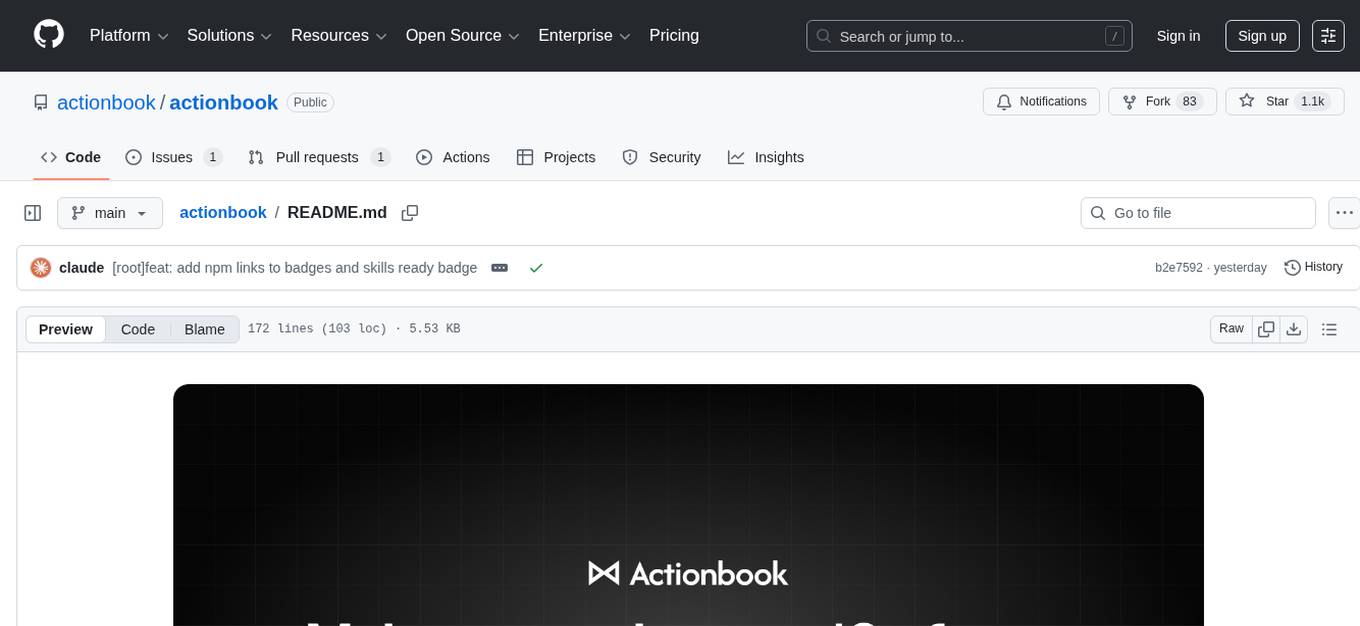
actionbook
Actionbook is a browser action engine designed for AI agents, providing up-to-date action manuals and DOM structure to enable instant website operations without guesswork. It offers faster execution, token savings, resilient automation, and universal compatibility, making it ideal for building reliable browser agents. Actionbook integrates seamlessly with AI coding assistants and offers three integration methods: CLI, MCP Server, and JavaScript SDK. The tool is well-documented and actively developed in a monorepo setup using pnpm workspaces and Turborepo.
For similar tasks
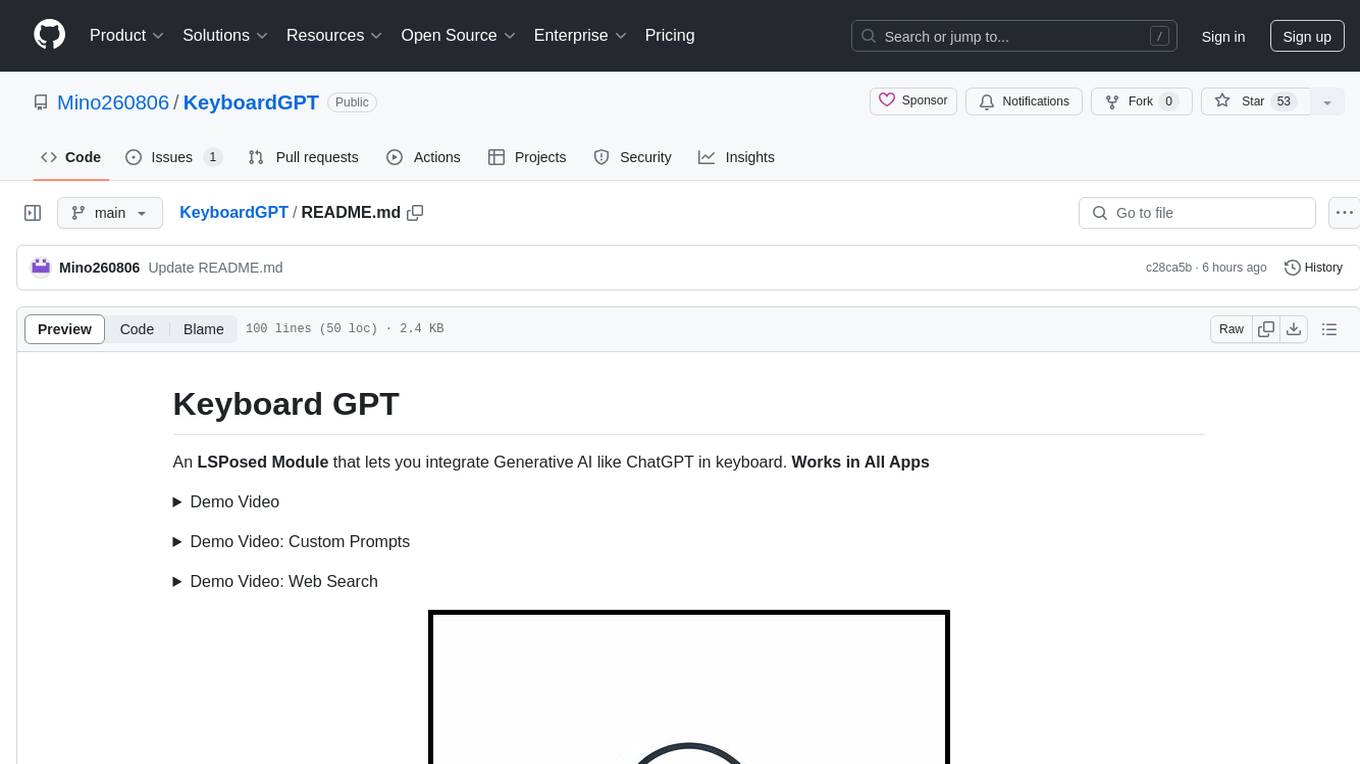
KeyboardGPT
Keyboard GPT is an LSPosed Module that integrates Generative AI like ChatGPT into your keyboard, allowing for real-time AI responses, custom prompts, and web search capabilities. It works in all apps and supports popular keyboards like Gboard, Swiftkey, Fleksy, and Samsung Keyboard. Users can easily configure API providers, submit prompts, and perform web searches directly from their keyboard. The tool also supports multiple Generative AI APIs such as ChatGPT, Gemini, and Groq. It offers an easy installation process for both rooted and non-rooted devices, making it a versatile and powerful tool for enhancing text input experiences on mobile devices.

PokeLLMon
PokeLLMon is a tool that allows users to set up a local battle engine for Pokémon battles. It requires Python version 3.8 or higher and OpenAI version 1.7.2 or higher. Users can configure the OpenAI API to enhance their battles. The tool provides a platform for users to engage in local battles by running the main Python script with their username and password for PokeLLMon.
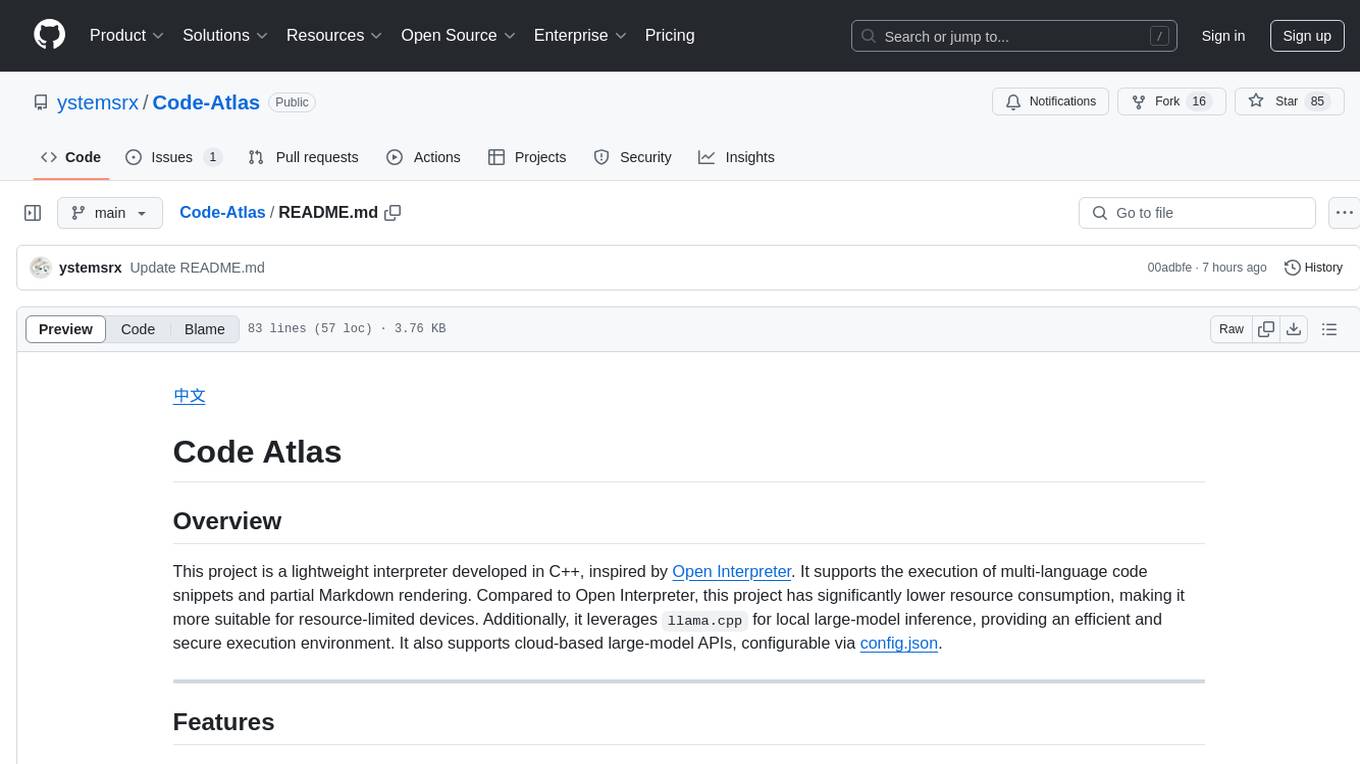
Code-Atlas
Code Atlas is a lightweight interpreter developed in C++ that supports the execution of multi-language code snippets and partial Markdown rendering. It consumes significantly lower resources compared to similar tools, making it suitable for resource-limited devices. It leverages llama.cpp for local large-model inference and supports cloud-based large-model APIs. The tool provides features for code execution, Markdown rendering, local AI inference, and resource efficiency.

Cerebr
Cerebr is an intelligent AI assistant browser extension designed to enhance work efficiency and learning experience. It integrates powerful AI capabilities from various sources to provide features such as smart sidebar, multiple API support, cross-browser API configuration synchronization, comprehensive Q&A support, elegant rendering, real-time response, theme switching, and more. With a minimalist design and focus on delivering a seamless, distraction-free browsing experience, Cerebr aims to be your second brain for deep reading and understanding.
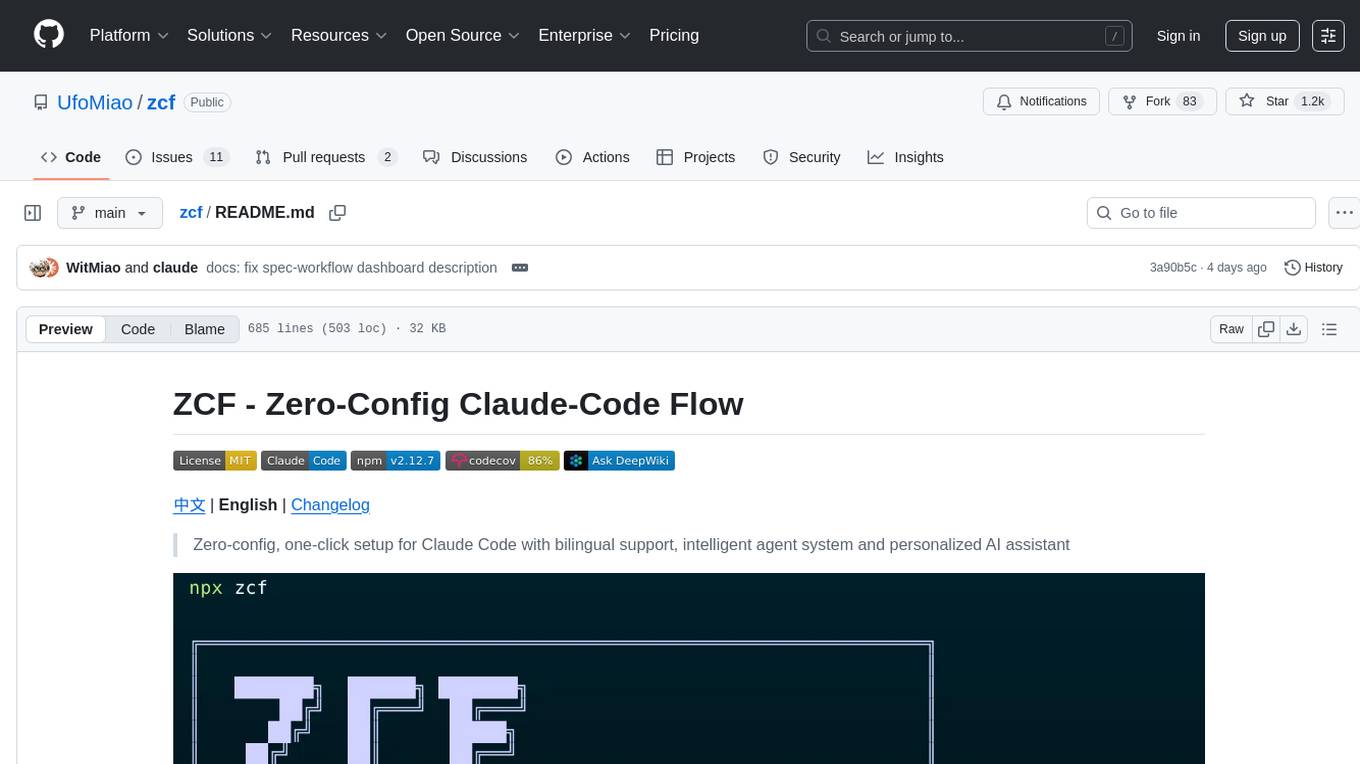
zcf
ZCF (Zero-Config Claude-Code Flow) is a tool that provides zero-configuration, one-click setup for Claude Code with bilingual support, intelligent agent system, and personalized AI assistant. It offers an interactive menu for easy operations and direct commands for quick execution. The tool supports bilingual operation with automatic language switching and customizable AI output styles. ZCF also includes features like BMad Workflow for enterprise-grade workflow system, Spec Workflow for structured feature development, CCR (Claude Code Router) support for proxy routing, and CCometixLine for real-time usage tracking. It provides smart installation, complete configuration management, and core features like professional agents, command system, and smart configuration. ZCF is cross-platform compatible, supports Windows and Termux environments, and includes security features like dangerous operation confirmation mechanism.
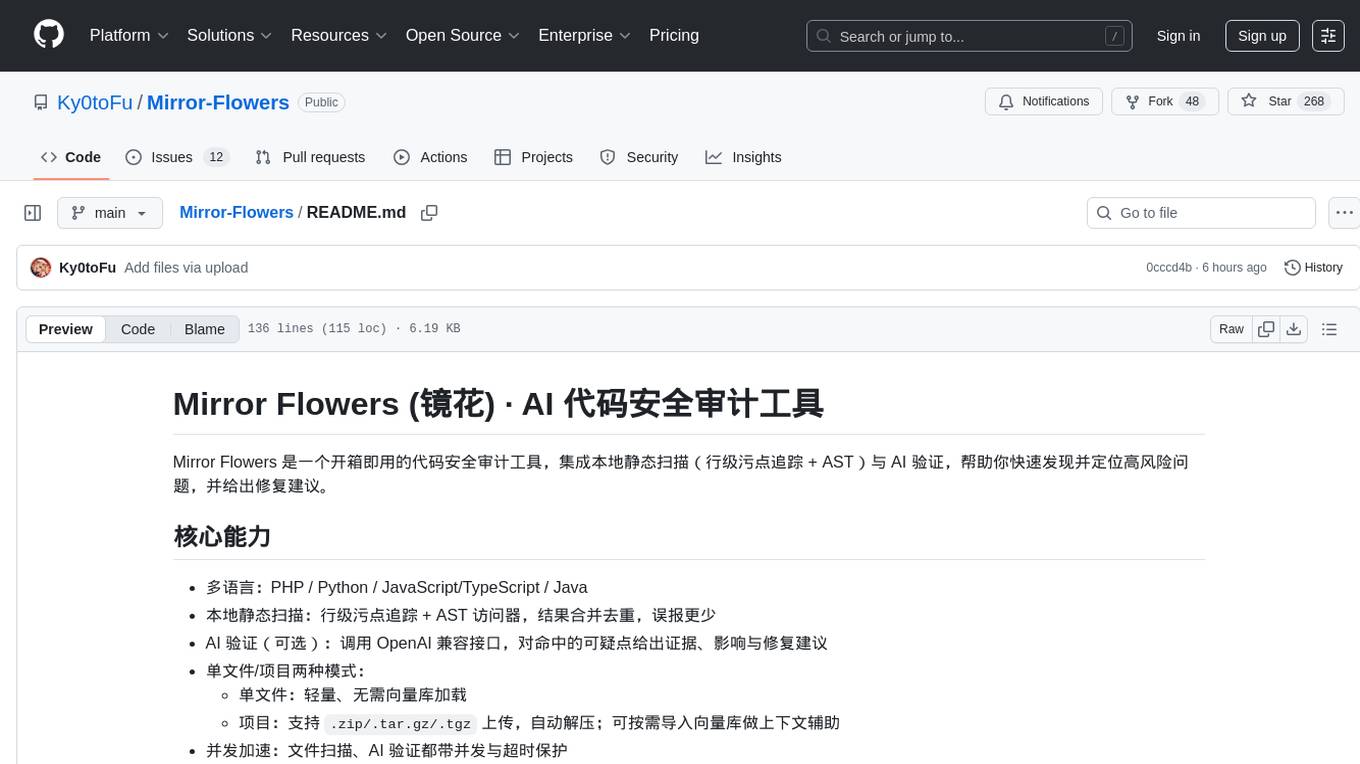
Mirror-Flowers
Mirror Flowers is an out-of-the-box code security auditing tool that integrates local static scanning (line-level taint tracking + AST) with AI verification to help quickly discover and locate high-risk issues, providing repair suggestions. It supports multiple languages such as PHP, Python, JavaScript/TypeScript, and Java. The tool offers both single-file and project modes, with features like concurrent acceleration, integrated UI for visual results, and compatibility with multiple OpenAI interface providers. Users can configure the tool through environment variables or API, and can utilize it through a web UI or HTTP API for tasks like single-file auditing or project auditing.
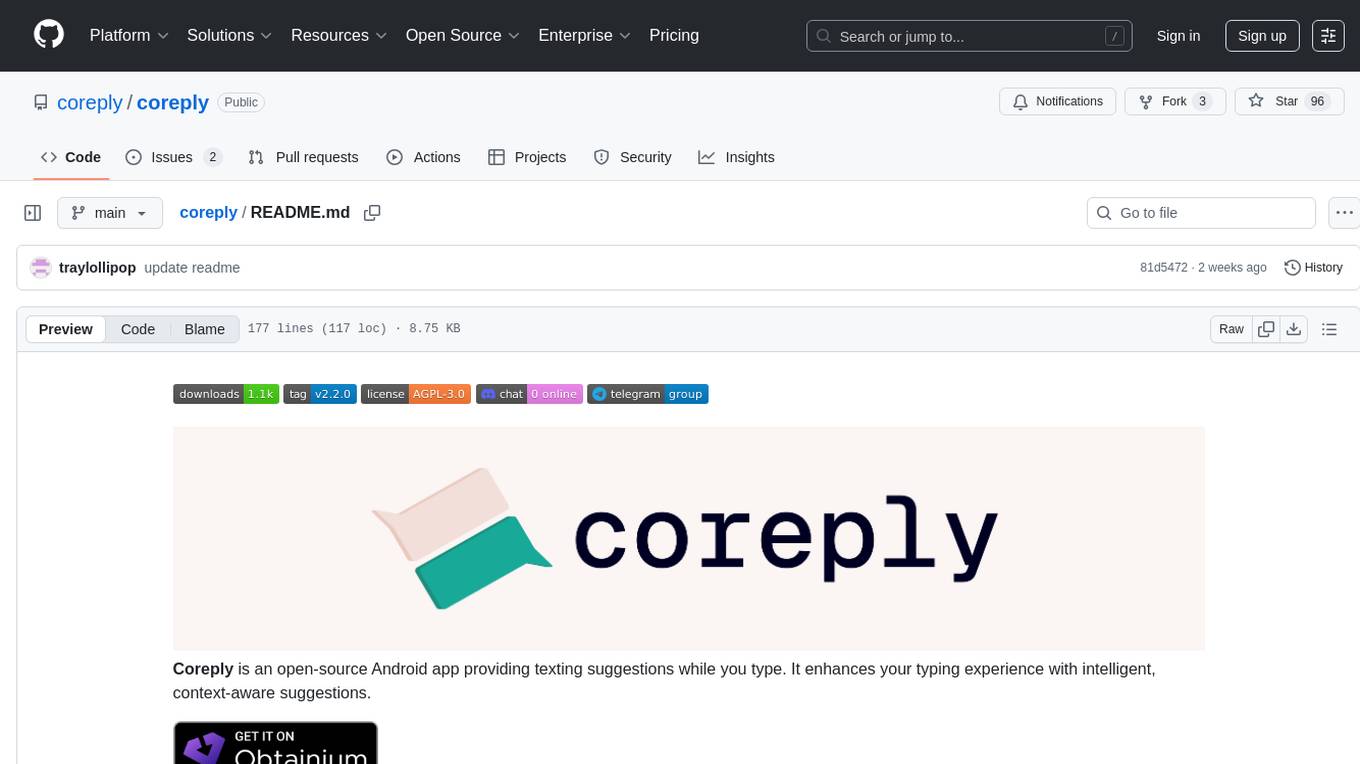
coreply
Coreply is an open-source Android app that provides texting suggestions while typing, enhancing the typing experience with intelligent, context-aware suggestions. It supports various texting apps and offers real-time AI suggestions, customizable LLM settings, and ensures no data collection. Users can install the app, configure it with an API key, and start receiving suggestions while typing in messaging apps. The tool supports different AI models from providers like OpenAI, Google AI Studio, Openrouter, Groq, and Codestral for chat completion and fill-in-the-middle tasks.
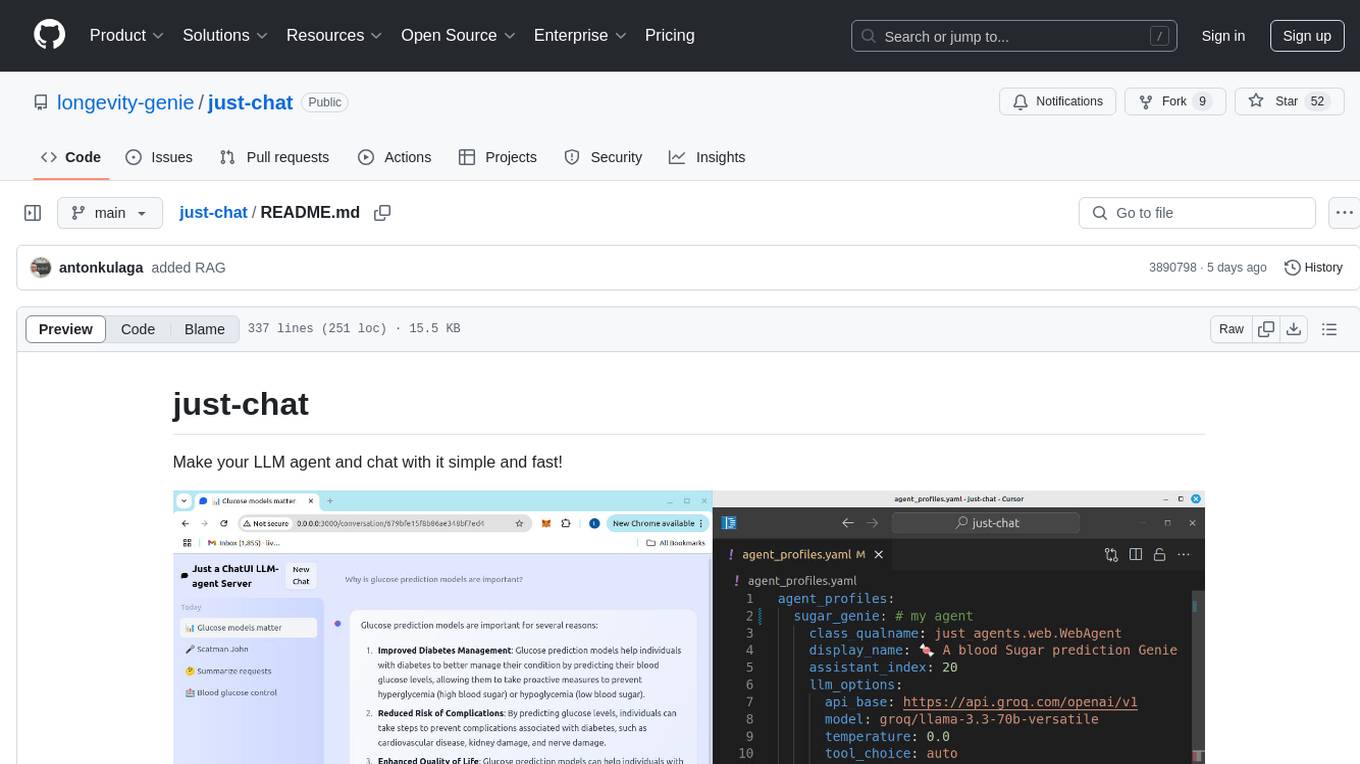
just-chat
Just-Chat is a containerized application that allows users to easily set up and chat with their AI agent. Users can customize their AI assistant using a YAML file, add new capabilities with Python tools, and interact with the agent through a chat web interface. The tool supports various modern models like DeepSeek Reasoner, ChatGPT, LLAMA3.3, etc. Users can also use semantic search capabilities with MeiliSearch to find and reference relevant information based on meaning. Just-Chat requires Docker or Podman for operation and provides detailed installation instructions for both Linux and Windows users.
For similar jobs

Perplexica
Perplexica is an open-source AI-powered search engine that utilizes advanced machine learning algorithms to provide clear answers with sources cited. It offers various modes like Copilot Mode, Normal Mode, and Focus Modes for specific types of questions. Perplexica ensures up-to-date information by using SearxNG metasearch engine. It also features image and video search capabilities and upcoming features include finalizing Copilot Mode and adding Discover and History Saving features.

KULLM
KULLM (구름) is a Korean Large Language Model developed by Korea University NLP & AI Lab and HIAI Research Institute. It is based on the upstage/SOLAR-10.7B-v1.0 model and has been fine-tuned for instruction. The model has been trained on 8×A100 GPUs and is capable of generating responses in Korean language. KULLM exhibits hallucination and repetition phenomena due to its decoding strategy. Users should be cautious as the model may produce inaccurate or harmful results. Performance may vary in benchmarks without a fixed system prompt.
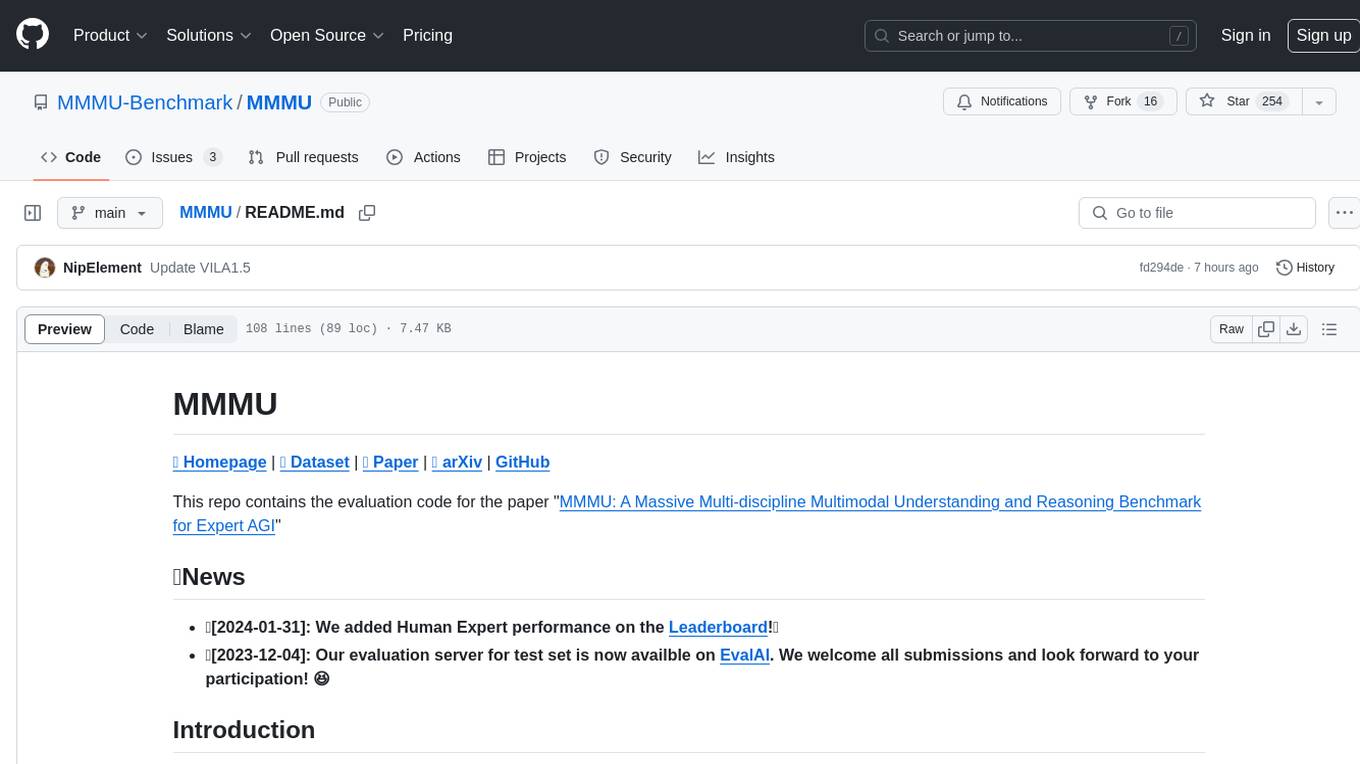
MMMU
MMMU is a benchmark designed to evaluate multimodal models on college-level subject knowledge tasks, covering 30 subjects and 183 subfields with 11.5K questions. It focuses on advanced perception and reasoning with domain-specific knowledge, challenging models to perform tasks akin to those faced by experts. The evaluation of various models highlights substantial challenges, with room for improvement to stimulate the community towards expert artificial general intelligence (AGI).

1filellm
1filellm is a command-line data aggregation tool designed for LLM ingestion. It aggregates and preprocesses data from various sources into a single text file, facilitating the creation of information-dense prompts for large language models. The tool supports automatic source type detection, handling of multiple file formats, web crawling functionality, integration with Sci-Hub for research paper downloads, text preprocessing, and token count reporting. Users can input local files, directories, GitHub repositories, pull requests, issues, ArXiv papers, YouTube transcripts, web pages, Sci-Hub papers via DOI or PMID. The tool provides uncompressed and compressed text outputs, with the uncompressed text automatically copied to the clipboard for easy pasting into LLMs.
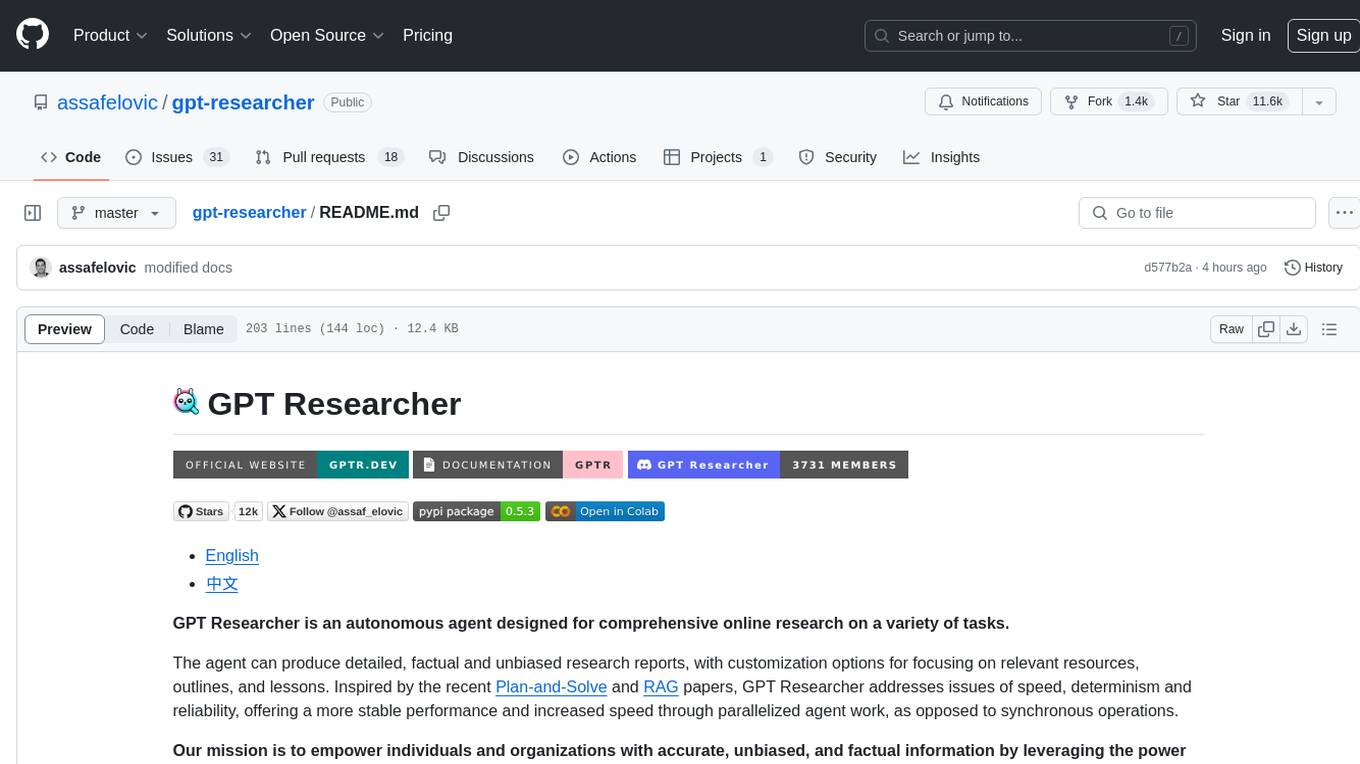
gpt-researcher
GPT Researcher is an autonomous agent designed for comprehensive online research on a variety of tasks. It can produce detailed, factual, and unbiased research reports with customization options. The tool addresses issues of speed, determinism, and reliability by leveraging parallelized agent work. The main idea involves running 'planner' and 'execution' agents to generate research questions, seek related information, and create research reports. GPT Researcher optimizes costs and completes tasks in around 3 minutes. Features include generating long research reports, aggregating web sources, an easy-to-use web interface, scraping web sources, and exporting reports to various formats.
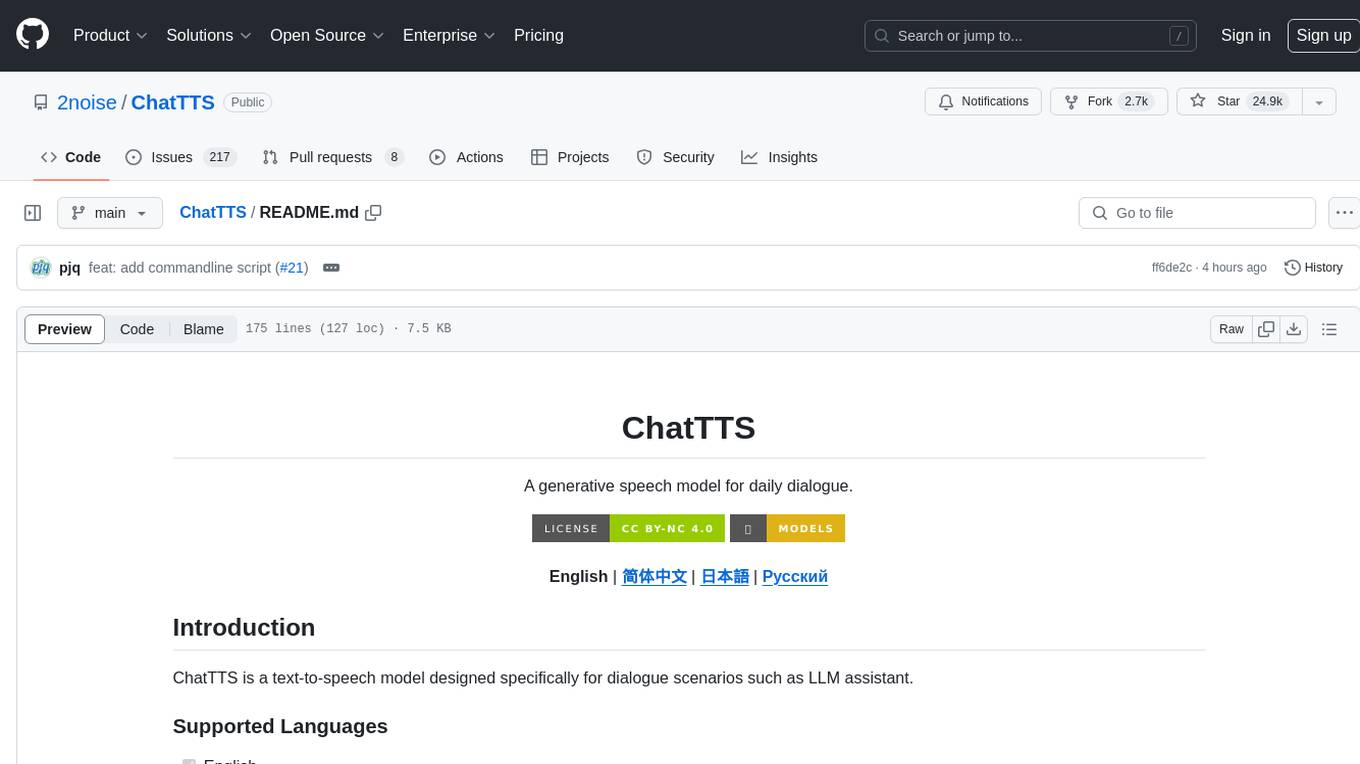
ChatTTS
ChatTTS is a generative speech model optimized for dialogue scenarios, providing natural and expressive speech synthesis with fine-grained control over prosodic features. It supports multiple speakers and surpasses most open-source TTS models in terms of prosody. The model is trained with 100,000+ hours of Chinese and English audio data, and the open-source version on HuggingFace is a 40,000-hour pre-trained model without SFT. The roadmap includes open-sourcing additional features like VQ encoder, multi-emotion control, and streaming audio generation. The tool is intended for academic and research use only, with precautions taken to limit potential misuse.
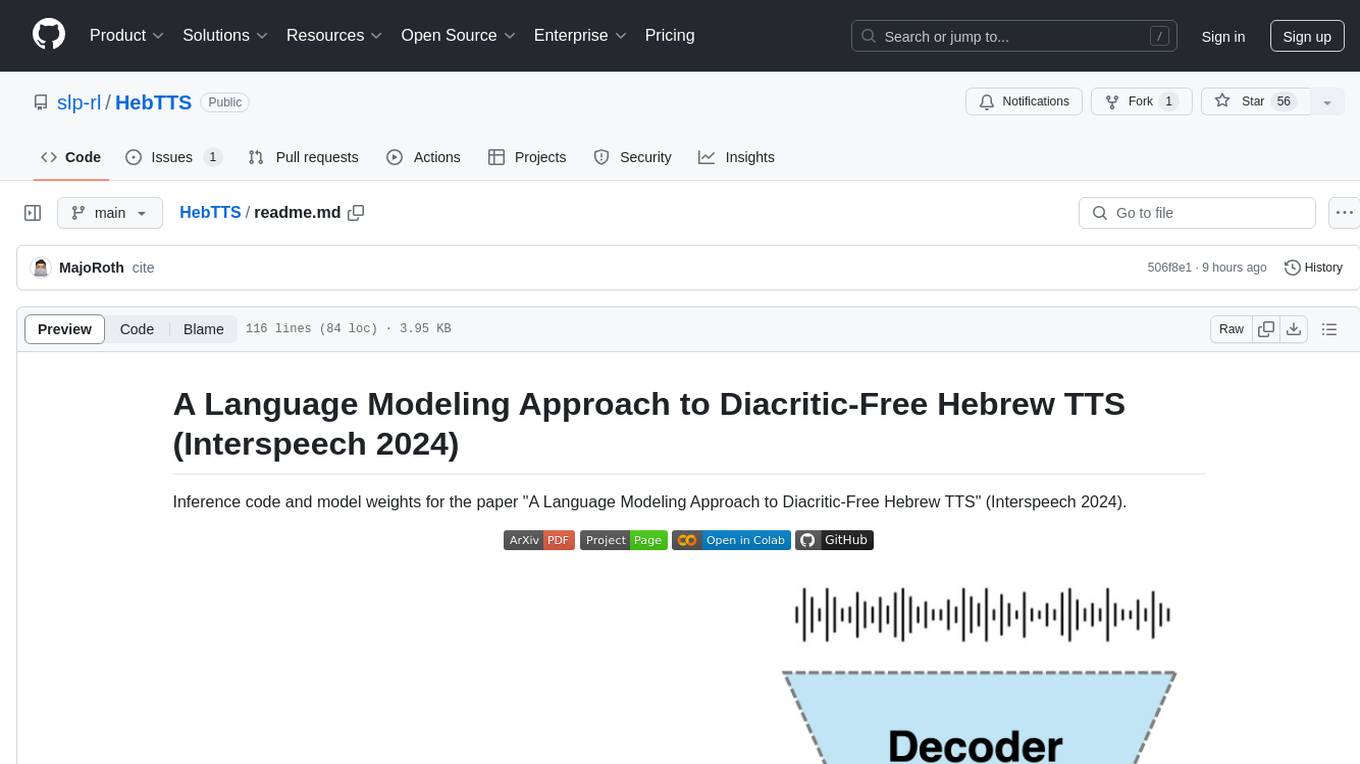
HebTTS
HebTTS is a language modeling approach to diacritic-free Hebrew text-to-speech (TTS) system. It addresses the challenge of accurately mapping text to speech in Hebrew by proposing a language model that operates on discrete speech representations and is conditioned on a word-piece tokenizer. The system is optimized using weakly supervised recordings and outperforms diacritic-based Hebrew TTS systems in terms of content preservation and naturalness of generated speech.
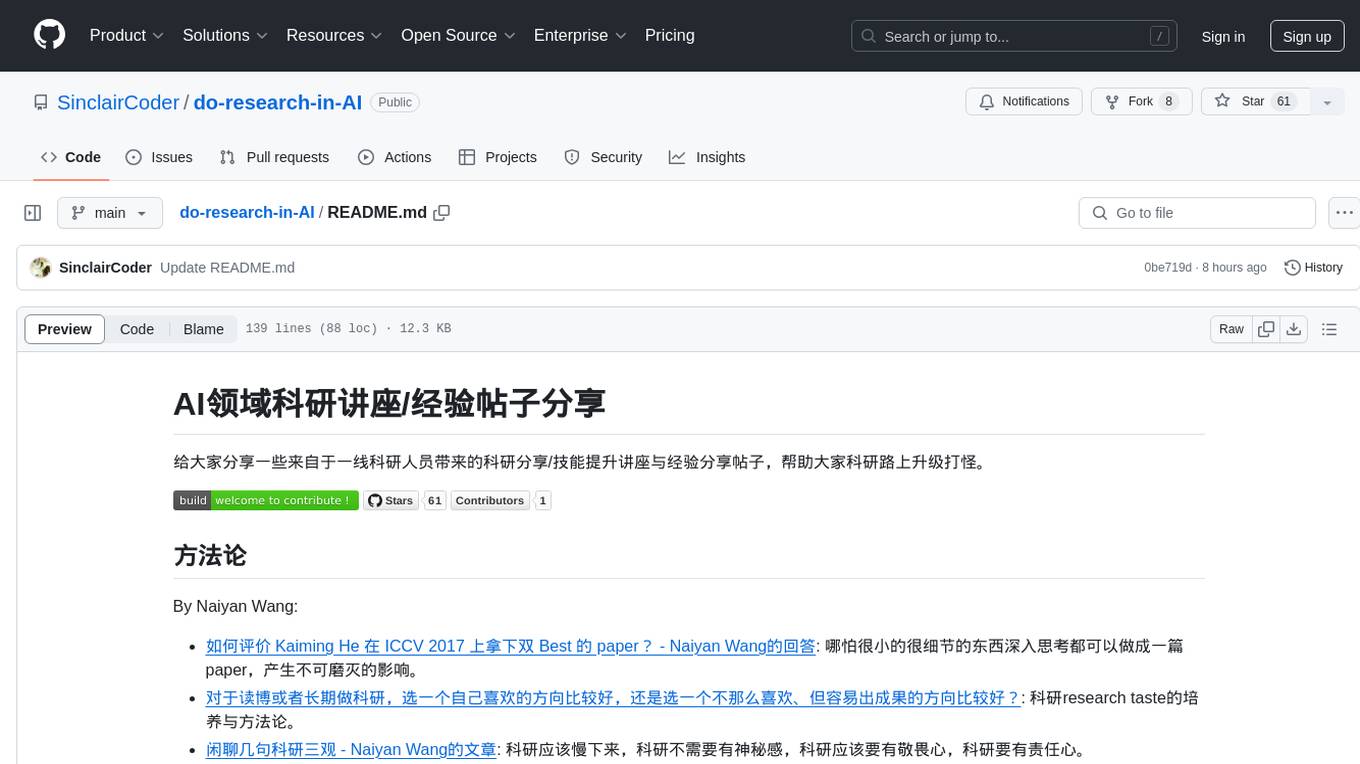
do-research-in-AI
This repository is a collection of research lectures and experience sharing posts from frontline researchers in the field of AI. It aims to help individuals upgrade their research skills and knowledge through insightful talks and experiences shared by experts. The content covers various topics such as evaluating research papers, choosing research directions, research methodologies, and tips for writing high-quality scientific papers. The repository also includes discussions on academic career paths, research ethics, and the emotional aspects of research work. Overall, it serves as a valuable resource for individuals interested in advancing their research capabilities in the field of AI.



